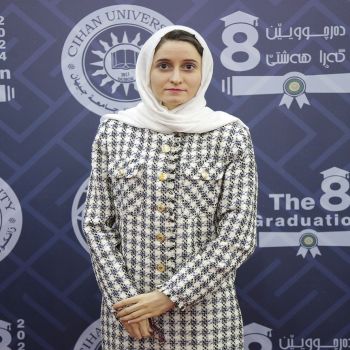
Phone : +964 (750) 344-7617
Birth Date: 1996-04-01
Nationality: Iraq
Address: Hai Askari- Duhok
Thikra Abdulqader Mohammed
Assistant Lecturer
Department of English
Speciality
Area Interest
Teaching Materials
Languages
English (Proficient)
Arabic (Intermediate)
Kurdish (Native)
Hobbies
Reading
Reading offers a unique blend of relaxation and intellectual stimulation, providing an escape into diverse worlds and ideas. It opens up pathways to knowledge, whether through fiction, which broadens empathy and imagination, or nonfiction, which deepens understanding of various subjects. As a hobby, reading fosters continuous learning and keeps the mind engaged, making it a favorite pursuit for lifelong learners and those who value personal growth.
Writing
Ms. Thikra enjoy creative writing—whether it's fiction or short pieces on scientific topics related to her specialization. Writing is a way to express ideas beyond academic boundaries and keep your mind engaged in a different, imaginative way.
Education
M.A.
Linguistics
B.A.
English Language and literature
Academic Title
Assistant Lecturer
Presentation
This presentation explored the intersection of linguistics and the legal system, focusing on how linguistic analysis can aid in criminal investigations and legal proceedings. Key topics included the methods used in forensic linguistics, such as authorship attribution, linguistic profiling, and the analysis of threats and testimony. The session highlighted real-world case studies where linguistic evidence played a crucial role in court decisions, demonstrating the importance of language in establishing credibility and intent. Participants gained insights into the practical applications of forensic linguistics and its significance in contemporary legal contexts.
Publication Journal
The role of Situational and Cultural Variables on Kurdish EFL Learners’ Willingness to Communicate in English
Willingness to communicate (henceforth, WTC) is an individual’s preparedness to voluntarily communicate with a particular individual or individuals in a specific context, using the target language. The present mixed-method study investigates Kurdish EFL learners’ WTC in English in the learning environment, particularly the role of situational and cultural variables. This study set out to identify the variables which foster or impede learners’ WTC in English so that language teachers can promote or control the variables within the classroom to optimize learners’ WTC in English. Quantitative and qualitative data were collected from 3rd year English majors employing a semi-structured questionnaire and an observation scheme. Analysis of data demonstrated that situational, cultural, psychological, and linguistic variables influenced learners' WTC in the learning environment. Findings lend support to the complex nature of WTC as an array of variables was found to underlie learners’ WTC in English. Finally, the findings gave rise to pedagogical suggestions for language educators, with particular reference to the implications of teaching Kurdish students in an EFL classroom environment.
Social Link
Google Scholar
orcid
ResearchGate
LinkedIn